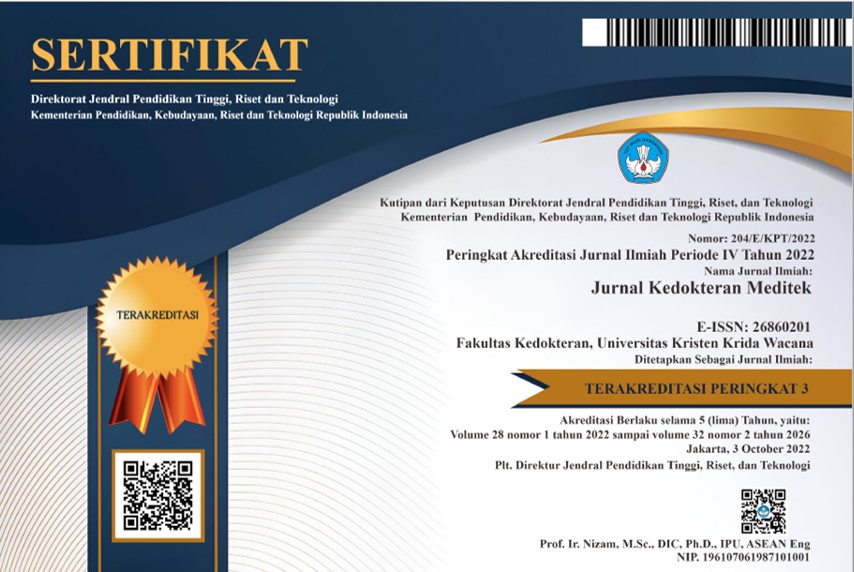Terapi Diabetes Melitus Tipe 2 Berbasis Hormon Inkretin
DOI:
https://doi.org/10.36452/jkdoktmeditek.v29i2.2664Keywords:
diabetes melitus tipe 2, Dipeptidyl Peptidase-4 Inhibitor (DPP4-inhibitor), Glucagon Like Peptide-1 Receptor Agonist (GLP-1 RA), hormon inkretinAbstract
Diabetes melitus merupakan masalah kesehatan global dengan tingginya angka kematian akibat berbagai komplikasi yang ditimbulkannya dan diabetes melitus tipe 2 menjadi penyebab utama kematian seiring bertambahnya penderita obesitas. Pengembangan obat-obat anti diabetes dilakukan, untuk menemukan kandidat obat baru yang tidak hanya menurunkan kadar glukosa darah tetapi diharapkan memiliki efek lebih, seperti mampu merestorasi fungsi sekresi sel β pankreas dan mengembalikan sensitivitas reseptor insulin yang terganggu. Penulisan tinjauan pustaka ini bertujuan membahas peran hormon inkretin dalam tubuh, gastric inhibitory peptide (GIP), dan glucagon-like peptide-1 (GLP-1) dalam merangsang sekresi insulin, serta peran/efek tambahan dari hormon-hormon tersebut yang secara fisiologis menguntungkan dan sejalan dengan pengobatan diabetes melitus tipe 2, seperti merangsang proliferasi dan meningkatkan ketahanan hidup sel β, juga perannya dalam menekan nafsu makan. Beberapa obat anti diabetes berbasis hormon inkretin yang telah digunakan di klinik, di antaranya kelompok obat glucagon like peptide-1 receptor agonist (GLP-1 RA), yang mirip dengan hormon inkretin endogen serta kelompok obat dipeptidyl peptidase-4 inhibitor (DPP4-inhibitor) yang menghambat degradasi GIP dan GLP-1
References
Cho NH, Shaw JE, Karuranga S, Huang Y, da Rocha Fernandes JD, Ohlrogge AW, et al. IDF diabetes atlas: global estimates of diabetes prevalence for 2017 and projections for 2045. Diabetes Research and Clinical Practice. 2018;138:271-81.
Czech MP. Insulin action and resistance in obesity and type 2 diabetes. Nature Medicine. 2017;23(7):804-14.
Rehman K, Akash MS. Mechanisms of inflammatory responses and development of insulin resistance: how are they interlinked? Journal of Biomedical Science. 2016;23(1):87.
Boer GA, Holst JJ. Incretin hormones and type 2 diabetes-mechanistic insights and therapeutic approaches. Biology. 2020;9(12).
Nauck MA, Meier JJ. The incretin effect in healthy individuals and those with type 2 diabetes: physiology, pathophysiology, and response to therapeutic interventions. The Lancet Diabetes & Endocrinology. 2016;4(6):525-36.
Nauck MA, Meier JJ. Incretin hormones: their role in health and disease. Diabetes, Obesity & Metabolism. 2018;20 Suppl 1:5-21.
Made SP, Pathni D. Tren terapi diabetes dengan GLP-1 receptor agonist. CDK. 2018;45:4.
Kristin E. Dipeptidyl peptidase 4 (DPP-4) inhibitors for the treatment of type 2 diabetes mellitus. J Med Sc. 2016;48:2.
Deacon CF. Dipeptidyl peptidase 4 inhibitors in the treatment of type 2 diabetes mellitus. Nature Reviews Endocrinology. 2020;16(11):642-53.
Soelistijo SASK, Lindarto D, Decroli E, Permana H, Sucipto KW, Kusnadi Y, et al. Pedoman pengelolaan dan pencegahan diabetes melitus tipe 2 dewasa di Indonesia. Jakarta:PB Perkeni; 2021.
Schwartz SS, Epstein S, Corkey BE, Grant SF, Gavin JR, 3rd, Aguilar RB. The time is right for a new classification system for diabetes: rationale and implications of the β-cell-centric classification schema. Diabetes Care. 2016;39(2):179-86.
Boucher J, Kleinridders A, Kahn CR. Insulin receptor signaling in normal and insulin-resistant states. Cold Spring Harbor perspectives in biology. 2014;6(1).
Drucker DJ, Habener JF, Holst JJ. Discovery, characterization, and clinical development of the glucagon-like peptides. The Journal of Clinical Investigation. 2017;127(12):4217-27.
Müller TD, Finan B, Bloom SR, D'Alessio D, Drucker DJ, Flatt PR, et al. Glucagon-like peptide 1 (GLP-1). Molecular Metabolism. 2019;30:72-130.
Holst JJ, Gasbjerg LS, Rosenkilde MM. The role of incretins on insulin function and glucose homeostasis. Endocrinology. 2021;162(7).
Kuhre RE, Gribble FM, Hartmann B, Reimann F, Windeløv JA, Rehfeld JF, et al. Fructose stimulates GLP-1 but not GIP secretion in mice, rats, and humans. American Journal of Physiology Gastrointestinal and Liver Physiology. 2014;306(7):G622-30.
Holst JJ. Incretin hormones and the satiation signal. International Journal of Obesity (2005). 2013;37(9):1161-8.
Shah M, Vella A. Effects of GLP-1 on appetite and weight. Reviews in Endocrine & Metabolic Disorders. 2014;15(3):181-7.
Alhadeff AL, Grill HJ. Hindbrain nucleus tractus solitarius glucagon-like peptide-1 receptor signaling reduces appetitive and motivational aspects of feeding. American Journal of Physiology Regulatory, Integrative and Comparative Physiology. 2014;307(4):R465-70.
Gallwitz B. Clinical use of DPP-4 inhibitors. Frontiers in Endocrinology. 2019;10:389.
Tan Q, Akindehin SE, Orsso CE, Waldner RC, DiMarchi RD, Müller TD, et al. Recent advances in incretin-based pharmacotherapies for the treatment of obesity and diabetes. Frontiers in Endocrinology. 2022;13:838410.
Frias JP, Nauck MA, Van J, Kutner ME, Cui X, Benson C, et al. Efficacy and safety of LY3298176, a novel dual GIP and GLP-1 receptor agonist, in patients with type 2 diabetes: a randomised, placebo-controlled and active comparator-controlled phase 2 trial. Lancet (London, England). 2018;392(10160):2180-93.
Potts JE, Gray LJ, Brady EM, Khunti K, Davies MJ, Bodicoat DH. The effect of glucagon-like peptide 1 receptor agonists on weight loss in type 2 diabetes: a systematic review and mixed treatment comparison meta-analysis. PloS One. 2015;10(6):e0126769.
Kapodistria K, Tsilibary EP, Kotsopoulou E, Moustardas P, Kitsiou P. Liraglutide, a human glucagon-like peptide-1 analogue, stimulates AKT-dependent survival signalling and inhibits pancreatic β-cell apoptosis. Journal of Cellular and Molecular Medicine. 2018;22(6):2970-80.
Meier JJ. GLP-1 receptor agonists for individualized treatment of type 2 diabetes mellitus. Nature Reviews Endocrinology. 2012;8(12):728-42.
Pi-Sunyer X, Astrup A, Fujioka K, Greenway F, Halpern A, Krempf M, et al. A randomized, controlled trial of 3.0 mg of liraglutide in weight management. The New England Journal of Medicine. 2015;373(1):11-22.
Home PD, Shamanna P, Stewart M, Yang F, Miller M, Perry C, et al. Efficacy and tolerability of albiglutide versus placebo or pioglitazone over 1 year in people with type 2 diabetes currently taking metformin and glimepiride: HARMONY 5. Diabetes, Obesity & Metabolism. 2015;17(2):179-87.
Frías JP, Davies MJ, Rosenstock J, Pérez Manghi FC, Fernández Landó L, Bergman BK, et al. Tirzepatide versus semaglutide once weekly in patients with type 2 diabetes. The New England Journal of Medicine. 2021;385(6):503-15.
Ludvik B, Giorgino F, Jódar E, Frias JP, Fernández Landó L, Brown K, et al. Once-weekly tirzepatide versus once-daily insulin degludec as add-on to metformin with or without SGLT2 inhibitors in patients with type 2 diabetes (SURPASS-3): a randomised, open-label, parallel-group, phase 3 trial. Lancet (London, England). 2021;398(10300):583-98.
Downloads
Published
How to Cite
Issue
Section
License
Copyright (c) 2023 Marcel Antoni

This work is licensed under a Creative Commons Attribution-NonCommercial-ShareAlike 4.0 International License.

















